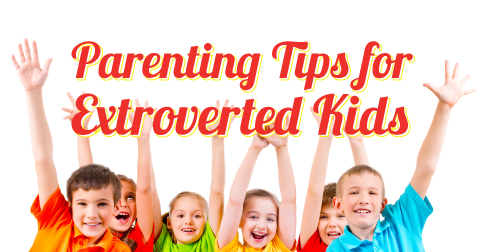
(If you have an extroverted child, check out our parenting tips for extroverted kids!)
You’re headed into the family reunion, but your child refuses to leave your side. Nor will he speak to distant cousins or great aunts. Over and over, you hear the refrain, “Aww, he’s a shy one.” Though no one means it to be so, you can’t help but feel you’ve done something wrong. But how?
Your child is quiet, well-mannered, and enjoys books and puzzles. He’s happy to talk with you and familiar adults in familiar settings. It’s only when the groups are large or noisy, the setting a previous unknown, or the situation new that he exhibits these qualities of shyness.
Introversion is not unusual or shameful. Studies estimate somewhere between 30-50% of America’s population are introverted. Biology supports the notion that introverts and extroverts have brains that are “wired differently” according to Dr. Marti Olsen Laney, author of The Hidden Gifts of the Introverted Child. Therefore, responses to stimuli vary greatly among the two groups. However, if you the parent tend to be more extroverted, you may struggle with helping your child adjust to situations that are exciting to you–but a drudgery for him. Here are some tips to help you navigate parenting an introvert so you bring out his best potential.
Introduce New People and Situations Gradually
Since introverted people (this is true for adults and children alike) tend to be overwhelmed in new environments, try not to expose too many at one time. For example, meet new people in a setting familiar to your child. Or when attending a group event, allow your child some quiet observation time rather than encouraging him to mingle right away.
Offer Breaks
Unlike extroverts, who are energized by social situations, introverts often experience social fatigue. Talking to multiple people, participating in group events, or even playing games with other children can be emotionally draining to your child. During an extended period of high social interaction, communicate that it is all right if your child wants to take a break. Expect that after a school day ends, your child will be quiet with you, simply because he is recharging.
Prep the Teacher
Most teachers are familiar with the characteristics of introverted students, however, it’s always a good idea to be sure your child’s behavior is interpreted correctly. Some teachers may misinterpret introversion as withdrawal, anxiety, or inattentiveness. Be sure to address any concerns you have. Prior to the start of a new school year, offer your child the opportunity to visit his classroom and meet his teacher. Walk through the building and identify all the places he will need to know. Familiarizing the setting will make the transition less stressful for your student.
Praise Social Risk
Parents often worry that their introverted child will be left out of events. Sometimes it is good to encourage your child to try a new play group or attend a birthday party so that you can help them learn to manage being introverted in an extroverted world. Be sure to praise them for stepping out of their comfort zone and trying something new.
Don’t Worry About Friends
Introverts are often happy with 1-2 close friends. For extroverts used to large groups of friends and many circles, this may seem as though your child is unpopular. Actually, introverts prefer a few deep friendships over many shallow ones.
Cultivate Passions
Don’t assume your introverted child will like–or excel–at the same activities you enjoy. Sports are wonderful for socialization and exercise, however, your introverted child may prefer drawing or reading. Let him pursue activities for which he is passionate. You can support this by looking for camps, classes, and groups that share his interests. By participating in those events, your child is more likely to encounter people of a similar temperament, which may lead to more of those deep friendships.
Give Alone Time
Introverted children are often characterized by how well they play alone. If your child enjoys quiet time and engages in independent activities, he is likely using this alone time to recharge for social situations. Encourage this and celebrate it–you are fostering self-sufficiency and self-care, important characteristics for children and adults.
For more information on raising an introverted child visit Quiet Revolution.

